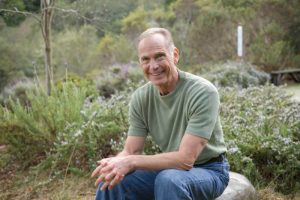John Robbins, Author and Healthy Eating Advocate
 John Robbins grew up in Southern California with a mapped-out future: His father was Irv Robbins of ice cream giant Baskin-Robbins, and was grooming him to take over the family business. But John had a change of heart that led him to shun animal products and, eventually, to turn down his family fortune. Instead, he became one of the world’s leading experts on the relationship between diet and the environment. From his bestseller Diet for a New America (HJ Kramer) to his latest book, The New Good Life (Ballantine Books), Robbins has helped Americans realize the potential plant-based diets have for improving personal and global well-being.
John Robbins grew up in Southern California with a mapped-out future: His father was Irv Robbins of ice cream giant Baskin-Robbins, and was grooming him to take over the family business. But John had a change of heart that led him to shun animal products and, eventually, to turn down his family fortune. Instead, he became one of the world’s leading experts on the relationship between diet and the environment. From his bestseller Diet for a New America (HJ Kramer) to his latest book, The New Good Life (Ballantine Books), Robbins has helped Americans realize the potential plant-based diets have for improving personal and global well-being.
1. E Magazine: The UN’s Food and Agriculture Organization found that livestock account for 18% of global greenhouse gas emissions. Why isn’t animal agriculture at the forefront of the climate change discussion?
John Robbins: It’s phenomenal to me that groups come out with lists like “20 Things You Can Do to Change the Environment” and will list “drive a fuel-efficient car” and “change your light bulbs,” but won’t say “eat less meat.” They are omitting the single-most powerful, most meaningful action you can take.
2. E: What are some of the hidden costs of animal products?
J.R.: Let’s say you take a shower every day and that these showers average seven minutes. That’s 49 minutes of showering a week. Let’s say that’s 50 minutes a week, with flow rates of two gallons a minute (which is very strong). At that rate, you’d be using 100 gallons a week for showering. That’s 5,200 gallons a year to shower. It takes 5,214 gallons of water to produce one pound of California beef [according to University of California Agricultural Extension]. You’d save as much water by not eating one pound of beef as you would by not showering every day for one year.
3. E: The meat industry has reported that they hope to double production by 2050. Is it up to the average consumer to change this?
J.R.: I think we change things one heart at a time, but if we overemphasize the personal responsibility to the detriment of looking at what we need to do collectively—like changing public policies and regulations—nothing really major will change.
4. E: Can individual action help in the meantime?
J.R.: Absolutely. Every time you buy something you are saying to that producer, “Do it again.” That’s how they interpret it. They produce what they can sell. If you care about the environment, don’t pay people to pollute it.
5.E: As we move forward, will small, local meat and dairy farms be a realistic solution for people who wish to continue mixed diets?
J.R.: They are a major, positive step. However, non-factory farms still only represent a fraction of 1% of the total animal products sold in the country. Well over 99% of meat, dairy and egg products come from factory farms. So far the big industry hasn’t changed one bit.

